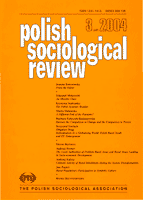The Local Authorities of Problem Rural Areas and Rural Areas Leading in Socio-economic Development
The Local Authorities of Problem Rural Areas and Rural Areas Leading in Socio-economic Development
Author(s): Andrzej RosnerSubject(s): Social Sciences
Published by: Polskie Towarzystwo Socjologiczne
Keywords: spatial diversity; local development; local government; problem rural areas
Summary/Abstract: This article presents the results of a multi-factor study of the heterogeneous socio-economic development of Polish rural areas. Historic determinants (centre-periphery) and specifies factors relating to the so-called situation rent (areas exceptionally attractive to tourists, the proximity of frontier crossings, transport nodes etc.) have contributed to this diversity. The results of the analysis are presented in the form of a map. An empirical study conducted on a contrasting sample (problem communes versus communes leading in socio-economic development) has revealed that the local authorities of the least developed areas are poorly prepared to utilise external developmental resources. The local governments of the poorly developed communes consist of fewer entrepreneurs and fewer highly-educated people with good professional qualifications. The local governments of the poorly developed communes are more often connected with political parties. Continuity of governance is lower in the problem communes than in the communes which are leading in socio-economic development.
Journal: Polish Sociological Review
- Issue Year: 147/2004
- Issue No: 3
- Page Range: 319-330
- Page Count: 12
- Language: English

